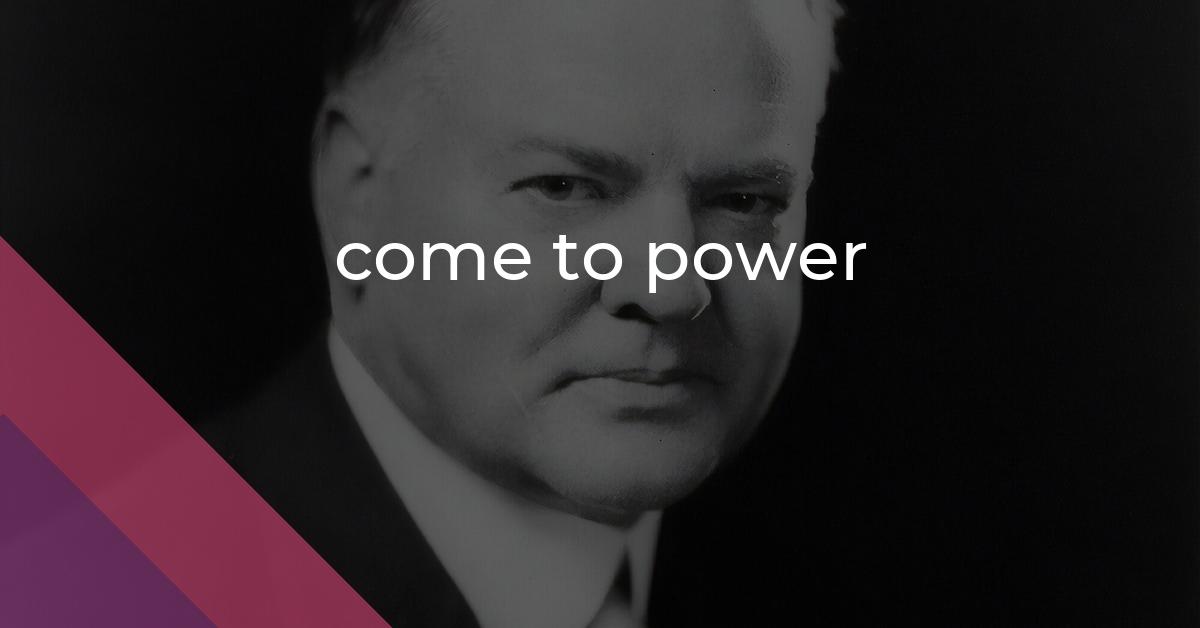come to power: Idiom Meaning and Origin
What does ‘come to power’ mean?
"Come to power" refers to the process or moment when someone or a group assumes control or authority over a country, organization, or institution.

Idiom Explorer
The idiom "powers that be" refers to the influential individuals or groups who hold authority or control over a particular situation or organization.
The idiom "Daniel come to judgement" means a person or group is being held accountable or facing a situation where their actions and decisions are being evaluated. It is often used in legal or moral contexts.
The idiom "come to papa" is an informal expression that is used to indicate someone's desire for possession or control over something. It is often used playfully or affectionately.
The idiom "come to life" means to suddenly become active or animated, often referring to an inanimate object or a previously dull situation. It signifies a lively transformation or a sudden burst of energy, making something more vibrant and engaging.
The idiom "come to an end" means that something, like an event or a period of time, is reaching its conclusion or finishing. It indicates the completion or termination of a particular situation or activity.
The idiom "come to" means to regain consciousness or to recover from a state of unconsciousness or shock.
The idiom "come out" means to make something known or to reveal something that was previously hidden or unknown.
The idiom "come of age" refers to the point in a person's life when they reach adulthood or become mature and responsible.
Origins Uncovered
The idiom "come to power" is a commonly used phrase in English. It refers to the ascension or assumption of leadership or control by an individual, group, or political party. The idiom implies a change in authority or the start of a new regime.
Historically, the phrase has been closely associated with political contexts, particularly with the rise of leaders, governments, or movements. It is often used to describe the transition from one political era to another, highlighting the transfer of power from one ruling entity to another.
The idiom "come to power" is related to the idiom "powers that be." This phrase refers to the people or groups who hold the highest positions of authority or control. It encompasses those who have the power to make decisions and shape policies. When someone "comes to power," they become part of the "powers that be," assuming a position of influence and responsibility.
The phrase "come to power" is also related to the idiom "in control." This phrase emphasizes the ability to direct or manage a situation effectively. When someone "comes to power," they gain the ability to be "in control" of the outcomes and decisions that affect a particular domain, whether it be politics, business, or personal relationships.
While the idiom "come to power" does not inherently specify the means or circumstances by which the power is attained, it is often used in the context of elections, coups, revolutions, or other major political events. The phrase can also be used in a more general sense to describe any transition of authority or control in various domains, such as businesses, organizations, or even personal relationships.
The idiom "come into being" is another related phrase. It captures the idea of something coming into existence or being brought into being. When someone "comes to power," they are essentially "coming into being" as a leader or person in authority. The phrase highlights the transformative nature of assuming power and the creation of a new order or regime.
The etymology of the idiom "come to power" can be traced back to the Middle English period, where the word "come" existed as a verb to denote movement or action. The word "power" emerged from the Old French word "povoir," which means "to be able" or "to have the ability."
Based on its usage and interpretation, the idiom "come to power" carries a connotation of the acquisition or attainment of authority, often through a deliberate or intentional process. It suggests a shift in the balance of power or a new phase in the governance or control of a particular entity.
In the context of political discourse, the idiom is frequently employed to analyze and discuss the dynamics of leadership, governance, and the consequences of those who come to power. It serves as a descriptive tool, allowing individuals to convey complex political scenarios succinctly.
As with many idiomatic expressions, the figurative meaning of "come to power" is not immediately evident from its literal interpretation. The idiom encapsulates the abstract notion of ascending to a position of authority or control, representing the complexities inherent in political and social systems.
The idiom "come to power" evokes a sense of change, transition, and the possibilities that arise from the transfer of authority. It invites further exploration into the motivations, methods, and ramifications involved in the process of assuming power. Understanding this idiom enriches our comprehension of political dynamics and the intricacies of leadership.
While the idiom "come to power" has been well-established in the English language, its continued usage and adaptability reflect the ongoing evolution of societies and the enduring relevance of examining power dynamics. The phrase encapsulates the fluid nature of governance and the perpetual cycle of change and renewal.
Example usage
Examples of how the idiom "come to power" can be used in a sentence:
- After years of political struggle, the new party finally came to power in the recent election.
- The military coup allowed the general to come to power and take control of the country.
- During the 20th century, several dictators came to power through force and oppression.
More "Politics" idioms



